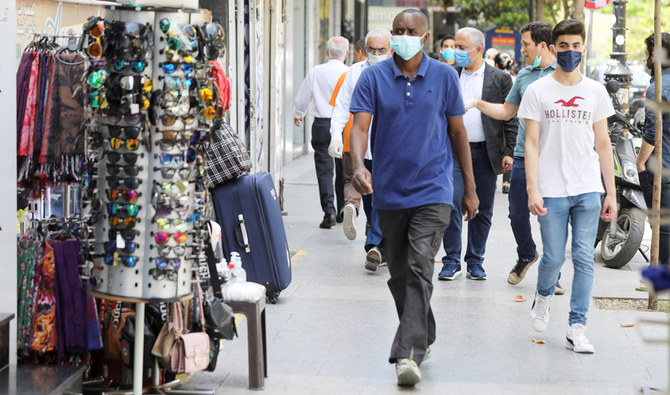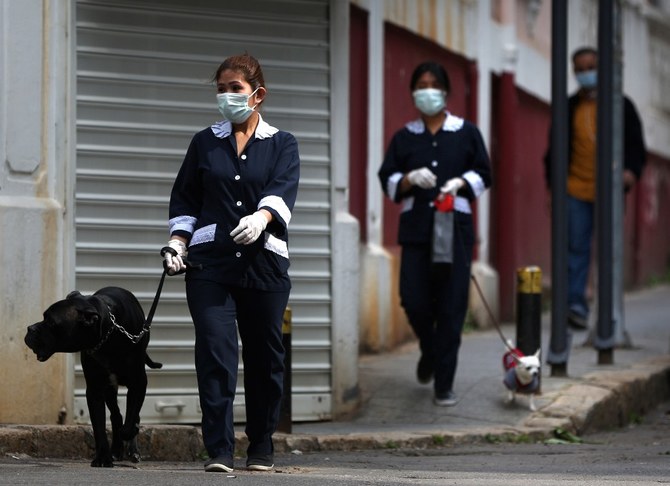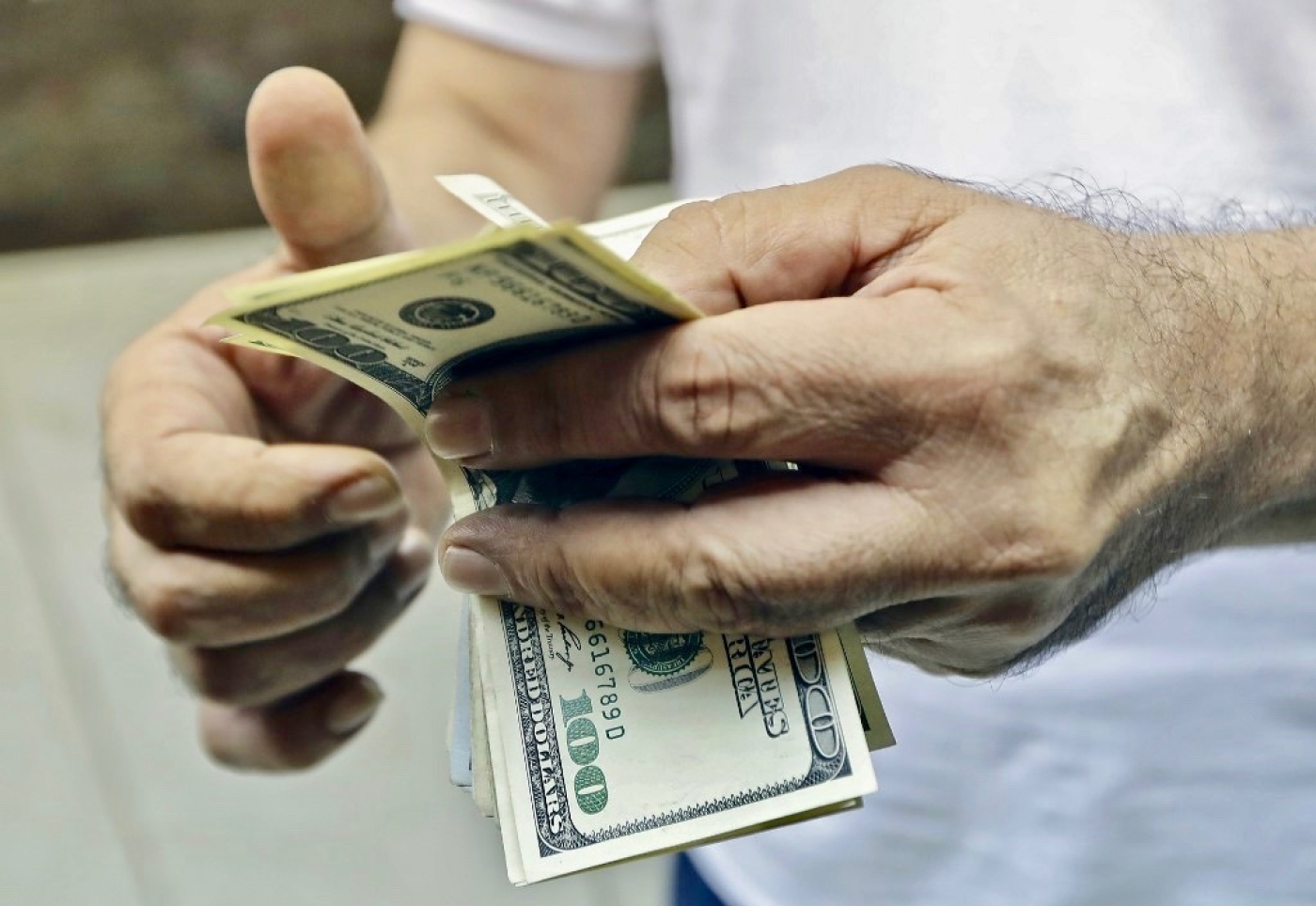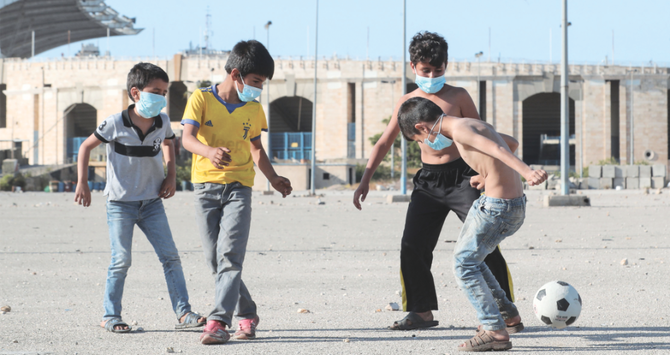The Daily Star — BEIRUT: The Lebanese pound rose slightly against the dollar on the parallel market Monday, steadying at around LL3,750 to the dollar. Black market exchangers were initially selling the dollar for around LL3,500 Monday morning but the rate steadied at around LL3,750 to the dollar by the afternoon. Those wanting to sell […]

by arabnews.com — NAJIA HOUSSARI — BEIRUT: The end of Lebanon’s four-day lockdown on Monday saw citizens flood to shops, banks, cafes, and places of work amid government fears that ignoring social distancing guidelines could have serious “consequences” for the country. Pressures caused by the economic crisis and collapse of the Lebanese pound forced the decision to reopen the country for business a week before Eid Al-Fitr, despite random testing for the coronavirus disease (COVID-19) detecting new cases in the capital Beirut and elsewhere. Prime Minister Hassan Diab said: “Each of us must take responsibility for himself.” Monday also witnessed a resumption of virtual talks between the Lebanese government and representatives of the International Monetary Fund aimed at easing the country’s dire financial situation. As the latest session of negotiations took place protesters returned to the streets to carry on their anti-government demonstrations, with sit-ins taking place outside the Palace of Justice in Beirut, the Ministry of Economy, and the Ministry of Social Affairs.
Many Lebanese emerging from the four-day curfew were reported not to be complying with government requests to wear a face mask and apply social distancing rules to avoid any further spread of COVID-19. Assem Araji, head of Lebanon’s parliamentary health committee, told Arab News: “Continuing to close the country is no longer useful in light of the suffocating economic crisis and the collapse of the Lebanese pound. “The country had to be reopened because the people want to eat and the unemployment rate touched 70 percent, according to the Ministry of Social Affairs. “The condition for this return to work was the commitment to preventive measures, but people seem not to want to comply and we cannot put a soldier for every citizen to force them to comply. It is the responsibility of individuals to take care of themselves, their families and all who come into contact with them, and I fear that recklessness will lead to consequences.”

Sarah Dadouch, The Washington Post — BEIRUT – The Lebanese love their food. Their elaborate spreads of grilled and sauteed meats, colorful salads and various vegetable dips, usually garnished with pine nuts, are a source of pride and the shared meals a symbol of generosity. Today, more than ever, food is on everyone’s mind – because there is so little to be had. From the butchers and taxi drivers of Beirut to the aficionados of Tripoli’s famed sweets to the anti-government protesters in the streets, hunger is on everyone’s tongue. Lebanon’s escalating economic crisis and its collapsing currency are putting the price of many foodstuffs beyond the reach of the Lebanese. The price of meat, for example, has doubled since March, with ground beef now running at about $9 a pound.
Mustafa, a 73-year-old butcher in Beirut, said the same customer has been calling him every other day for weeks asking whether the prices have dropped: “He calls and says, ‘No, that’s expensive,’ and hangs up. But it’s only getting more expensive.” Mustafa who out of fear declined to give his full name, said he no longer bothers updating his price list. Rarely does a Lebanese meal lack tomatoes – minuscule cubes hiding among parsley and bulgur in tabbouleh salad, or stewed with onions and garlic, a base for countless other dishes – but tomato prices have also doubled.
Shoppers who used to haul away kilogram after kilogram of tomatoes without a second thought are rationing, buying half a kilo or a few tomatoes at a time, said one grocer, shaking his head in disbelief. And in the northern city Tripoli, which is known for its sweets – the most famous featuring semolina-and-cheese dough wrapped around clotted cream and drizzled with orange-blossom syrup – and where desserts are never an afterthought, the city’s most famous confectioner, Hallab, was uncharacteristically empty. Even though it was Ramadan, when an evening meal usually lasts for hours and ends with the family gathering around the television with tea or coffee and a flaky or creamy dessert, there was no holiday rush. “We can’t even buy dessert,” Um Ahmed, a Tripoli resident, said wearily. “The dessert shops are open, but there’s no money.” “Well, there are those who have money,” her husband, Abu Ahmed, said sarcastically, “such as our ministers and MPs – may God protect them.”
by Sunniva Rose – thenational.ae —The wife of Lebanese Prime Minister Hassan Diab has come under fire for suggesting nationals could take low-skilled jobs traditionally held by migrant workers, including as domestic workers or janitors. Nuwar Mawlawi’s comments come as the country faces a dire economic crisis and soaring unemployment and povertyyet where many unskilled or semi-skilled jobs are almost exclusively held by foreign nationals. “We could dispense with migrant workers,” Ms Mawlawi told state-run Radio Lebanon on Friday. “Women sitting at home could work in homes. That is a simple example. Janitors, fuel stations jobs would be for locals.” Her comments sparked debate on social media with some supporting her comments, while others used the derogatory hashtag “Hassan, control your wife”. “All governments in the world are trying to improve the conditions of their people except for Hassan Diab’s wife,” one user tweeted. “She wants girls and women to work as maids and housekeepers.” Like many who expressed outrage at Ms Mawlawi’s words, the user told of his allegiance to Mr Diab’s predecessor and fierce critic, Saad Hariri.
Mr Diab’s office defended Mrs Mawlawi, saying she meant that the “Lebanese must depend on themselves in light of the difficult economic conditions that Lebanon is going through”. She declined to comment on the debate. Economist and former labour minister Charbel Nahas said the suggestion that Lebanese could take low-skilled jobs is a deeply held taboo. “Ms Mawlawi’s words may be glaringly obvious but they hurt the sense of superiority of the Lebanese,” Mr Nahas told The National.

by arabnews.com — NAJIA HOUSSARI — BEIRUT: Foreign workers in Lebanon are seeking repatriation because the country’s dire economic situation has left employers unable to pay them. Many Lebanese people have ditched their foreign domestic help to avoid the cost of repatriating them to their home countries, or returned them to the employment agencies they were recruited from. Domestic workers have also run away after employers stopped paying their salaries, seeking refuge in the embassies of their home countries in their bid to be evacuated. There are more than 150,000 foreigners working legally in Lebanon, and 80,000 working illegally. “We received videotapes of the detention of some 26 Filipino female workers, including a pregnant woman, in a building adjacent to their country’s embassy in the Hadath area in the southern suburb of Beirut more than 35 days ago,” Bassam Kantar, a member of Lebanon’s National Human Rights Commission, which includes the Committee for the Prevention of Torture (LNHRC-CPT), told Arab News. “They were kept in a room in poor conditions. We visited the embassy and talked to the officials. There are more than 100 other workers inside the consulate awaiting repatriation.”
Kantar said that the LNHRC-CPT had been contacted by other foreigners requesting repatriation, especially those who were working illegally. “The LNHRC-CPT contacted Lebanese General Security and it decided to exempt the employees from paying the residency allowance and fines. But it is unable to return them to their countries because it is the responsibility of their embassies.” He said that there was cooperation between the International Organization for Migration and Lebanese General Security to transfer such workers through planes belonging to airlines of other countries that were carrying workers of other nationalities. Some airlines refused to send empty planes to Lebanon due to huge losses, he said, but explained the biggest problem related to workers from countries with which Lebanon had no diplomatic relations.

by middleeasteye.net — Sixteen people in Lebanon, mostly Syrians, were arrested for money transfers and “illegal” currency exchange operations, the army said on Saturday, amid a government crackdown on exchange rate manipulation. The army said in a statement that it had arrested 13 Syrians and three Lebanese who were carrying out “money transfers and illegal currency exchange transactions, using licensed companies and offices as a front”, AFP reported. The suspects used an “unlicensed online platform belonging to one of the financial companies” to carry out the financial transactions, the statement said. The Lebanese pound has been pegged to the dollar at 1,507 since 1997, but the country’s worst economic crisis in decades has seen its value plunge to less than 4,000 on the black market.
The government has sought to stem the fall by launching a nationwide crackdown on money changers it alleges are exchanging the pound for dollars at a rate weaker than the 3,200 per dollar permitted by the central bank. During the arrests, the army seized “significant sums” and also computers and laptops used in the operations, the statement added, specifying that the arrests took place in 12 regions across Lebanon. The network sent dollars with motorists across the border to Syria, specifically to the northwestern province of Idlib, a security official said, referring to a region controlled by rebels. After land borders closed because of the coronavirus pandemic, the network started using an “illegal online platform” controlled by a Lebanese money changer, the official added.

by catholicleader.com.au — Peter Bugden — MARONITE Catholics of Brisbane are appealing for prayers for Lebanon, a nation in crisis. “We would like people to join us in prayers. Really, that’s the main thing that we need,” George Tawk, a Lebanese Catholic from the Maronite parish of St Maroun’s, Greenslopes, said. “Just we need them to join us in prayers for the safety of Lebanon, especially because Lebanon has the biggest Catholic community in the Middle East – next to where Jesus was born, next to the Holy Land. “What we really need, we need support through prayers and through emotional and sentimental support.” Mr Tawk, who is in daily contact with family members in Lebanon, keeps track of the nation’s woes as it suffers under a corrupt government and economic crisis. Nationwide protests erupted last October and continued until the outbreak of the COVID-19 pandemic. “People took to the streets from all religions – Christians, Muslims, Jews – everyone just got up and said that we should get rid of all these people, all these corrupt people, and come back with a new generation (of leaders) …,” Mr Tawk said. “There was two million people in the streets protesting against corruption. “And all these protests kept happening till the coronavirus hit.”
The protests stopped as citizens went into isolation. “But people were worried that during all the isolation, the government could be doing something in secret, especially because the value of our Lebanese lira went dramatically down. “And prices of (everything) including food, went up by three or four times. “So people decided, ‘Well, that’s it, even with the coronavirus, we’re going back onto the streets because we can’t support this anymore’. “It looks like the Lebanese people are really determined to go all the way, whatever the cost is”. Mr Tawk said his family indicated protesting was the people’s last resort. “In Lebanon, there is no other choice,” he said. “Going back is not an option because things can’t get any worse.”

by english.aawsat.com — Lebanon is ready to terminate a 23-year-old dollar peg and float the pound, but only after it secures billions in aid, Finance Minister Ghazi Wazni said Friday. Speaking to AFP after talks started Wednesday with the International Monetary Fund on a plan to rescue Lebanon’s crisis hit economy, he also said banking sector restructuring would entail halving the number of lenders. Foreign exchange shortages have in recent months severely strained the official rate of 1,507 to the dollar, with the pound losing well over half its black market value to trade at considerably beyond 4,000 against the greenback. “The IMF always asks for the freeing of the pound’s exchange rate,” Wazni said. But “we need to change the stabilization policy to one of a flexible exchange rate in a first stage and for the foreseeable future,” he said, referring to an initial managed flotation. “When we receive financial support from abroad, we will transition to flotation” dictated by the market, he said. “The Lebanese government has asked for a transitional period to pass through a flexible exchange rate before we reach flotation,” he added. Wazni said the first phase would involve a gradual depreciation of the Lebanese pound against the dollar, in coordination with the central bank. He said this was necessary because the government feared a “huge deterioration of the pound exchange rate” otherwise.
Merging banks
Lebanon, which was hit last autumn by unprecedented protests, asked the IMF for financial assistance on May 1 after laying out a much-awaited financial rescue plan. That plan aims to drum up billions of dollars in aid, reduce the deficit, restructure a colossal debt burden and slim down an oversized banking sector. Wazni said banking sector restructuring would be carried out “step by step”, and possibilities included “merging” financial institutions. “Lebanon counts 49 commercial banks and it is normal for that number to decrease to around half of that in the next stage,” he said. Wazni said that the IMF had however not set any political conditions for financial assistance. “No political conditions have been set,” he said.

by middleeasteye.net — Algeria’s president, Abdelmadjid Tebboune, has launched an investigation into a wide-reaching scandal that has embroiled Algerian state energy firm Sonatrach for the last month in Lebanon. Lebanese officials have accused Sonatrach of delivering defective fuel to state-owned Electricity of Lebanon (EDL), and have made 20 arrests since April, including Sonatrach’s Lebanese representative, Tarek Faoual. Last week, Sonatrach denied “the inaccurate and untrue allegations about the involvement of a senior Sonatrach official in this case”, stating that Faoual was an independent maritime agent, working for a subsidiary on behalf of Sonatrach Petroleum Corporation (SPC). Algerian presidential spokesperson, Mohand Oussaid Belaid, on Wednesday described the scandal as a “Lebanese-Lebanese issue” and stated that “Algeria as a state will not be involved” but that “Algerian justice will take care of the part concerning Algeria”. SPC also released a press release to protest the “vile coordinated defamation campaign aimed at damaging the reputation of the company”. Belaid’s comments came a week after Lebanese Minister of Energy and Water Raymond Ghajar received Algerian ambassador to Lebanon, Abdelkrim Rekibi, to discuss the case.
‘Secret’ contract
In the same week, Lebanese MP Paula Yacoubian blasted the “secret” nature of the contract signed between the Algerian national oil company and the Lebanese state in 2005, the same year Algeria announced that its extensive gas reserves were open for business. “The defective fuel case is a huge scandal, documented by numerous reports,” Yacoubian stated at a press conference in parliament, denouncing how certain parties “are beginning work to bury it”. “Petroleum waste is sent to Lebanon and the investigation into this must include the company that operates the central shipping,” the lawmaker added, referring to Sonatrach, also accusing “community leaders and senior politicians” of involvement in the scandal. Last month, EDL informed Lebanese courts that the London branch of Sonatrach had delivered “defective” fuel in its two most recent shipments.

by arabnews.com — NAJIA HOUSSARI — The Lebanese Army, Internal Security Forces (ISF) and municipal police patrolled the streets to catch anyone violating the measures, while ISF armored vehicles were deployed on the streets of Beirut and check points were set up across the country. The exchange rate of the dollar to the Lebanese pound (LBP) slightly decreased on the black market in light of the closure of banks and money exchange shops. It was bought for LBP4,150 and sold for LBP4,250. Pharmacies, bakeries, food stores and gas stations were exempted from closing, while security forces caught and issued tickets to beachgoers. People in Tripoli were outraged by the total lockdown amid the economic crisis they are suffering from. Some even tried to open their shops by force on Wednesday night but, the security forces prevented them from doing so.
During a Cabinet meeting held on Thursday, the minister of health, Hamad Hassan, announced: “The ministry’s medical teams were deployed in various regions across the country as part of a widespread campaign aimed at testing those who came in contact with confirmed cases and those suspected of carrying the virus, in order to update the data related to the country’s epidemiological situation.” Hassan is scheduled to provide the government with a report on Sunday, showcasing the information gathered during the lockdown “so that we can work accordingly.” The third phase of the country’s repatriation process started on Thursday with Middle East Airlines (MEA) aircraft bringing back Lebanese nationals who had been tested for COVID-19 from Istanbul, Riyadh, Paris, Abuja, Abu Dhabi and London. Lebanese diplomatic sources told Arab News: “The repatriation of Lebanese citizens will continue to take place by air. So far, we do not intend to bring them back by sea.”




